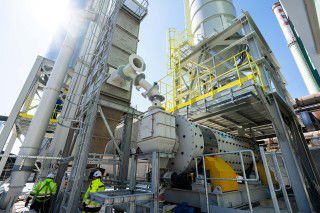A report by analysts CIC-Market Solutions forecasts that construction activity is expected to decline after 2022. The assumption is based on a reduction in spending ability in France and Germany, as well as the potential impact from interest rate rises, supply bottlenecks and further energy price rises in the context of the war in Ukraine.
The main risk factors cited are rising rates, higher costs and supply shock. “The effects from a triple economic shock that has been observed since summer 2021 and which has been increasing since the war began in Ukraine, should be transmitted, albeit with a time lag, to the construction sector by the end of the year with the full effect in 2023,” claims CIC-Market Solutions.
Labour shortages
A more immediate impact is labour shortage that has begun in southern Europe. Post-COVID, it appears that Europe's construction sector is booming with no slowdown of projects with the roll-out of EUR750bn EU coronavirus recovery funds, but Italy, Greece, Spain and Portugal are all seeing labour shortages and wage spirals could lead to delays or cancellations of construction projects, according to the Financial Times. Southern Europe's workforce is still below 2011 levels, reports Eurostat. The UK's Office of National Statistics reports that there are 244,000 fewer construction labourers in the country than in 2019. However, wages are moving at an accelerated pace in Europe with average labour costs rising by 22.5 per cent to US$65 in 2022, say industry analysts at KHL.
Cost increases
Inflation is having a further punishing effect on the pace of construction. Arcadis reports that the European and North American construction sector has seen double-digit cost increases during 2021 and the screw has tightened further in the 1H22. Prices for cement and other materials are expected to continue to rise over the next few months, on top of already promising price increases. In the UK, for example, YoY prices for all building work rose by 25.2 per cent from April 2021-April 2022, according to Business, Energy and Industrial Strategy (BEIS). Aggregates, ready-mix concrete and piping has increased every month in the 1Q22, according to BEIS.
Construction slowdown
Building material suppliers are already concerned at what lies ahead in 2022. The Construction Products Association in the UK reports that nearly a third of heavy side producers expect sales to fall in the 3Q22, with 56 per cent anticipating a five per cent sales fall in the next year and 22 per cent confident of an increase. In June Britain's construction sector slowed sharply with its weakest expansion since September 2021. Housebuilding is contracting for the first time since initial months in the COVID-19 pandemic, according to S&P Global Managers' Index.
The wider picture in central and eastern Europe is giving further support that the construction sector will face increasing headwinds in the latter part of 2022. Analysts ING note that Polish industry is proceeding at double-digit pace, but the construction sector slowed. Hungary saw construction output growth at a 12-month low in April 2022. Optimism may well be returning though in Hungary as May's construction output saw a 9.9 YoY advance.
Eurostat data reveals that seasonally-adjusted production for the construction sector in the Eurozone edged up by 0.4 per cent in May, and by 0.8 per cent across the wider European bloc. However, in April it has declined by one per cent and by 1.1 per cent in the Eurozone and EU, respectively.
"The weakness in the surveys in June, particularly the new order indices, suggest the sector will start the third-quarter on a weak footing," said Melanie Debono, senior European economist at Pantheon Macroeconomics.
Summary
“A more pronounced deterioration, particularly in the most interest-rate sensitive sectors such as construction, has become much more likely given the increasingly challenging outlook on various fronts,” says Ken Wattret, vice president of economics at S&P Global Market Intelligence. The European Central Bank expects to raise interest rates beyond September to ensure that inflation returns to a path nearer to two per cent target over the medium term. Until inflation is under control and there is peace in the Russia-Ukraine war, price rises and labour shortages will continue to impact the construction sector in many European countries with the threat of recessions looming large.
